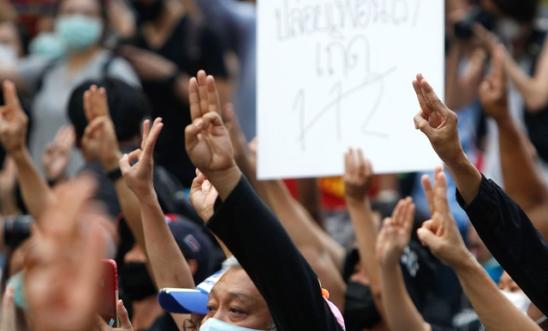
Press releases
Thailand: Future government must protect people’s right to protest

Since 2020 at least 1,902 people faced charges for criticising the Government or protest
242 people face serious national security charges for lèse-majesté
‘The upcoming vote offers a rare opportunity for political parties and candidates to publicly commit to the protection and promotion of human rights if elected’ - Chanatip Tatiyakaroonwong
Ahead of Thailand’s general election on Sunday 14 May, Chanatip Tatiyakaroonwong, Amnesty International's Thailand Researcher, said:
“The upcoming vote in Thailand offers a rare opportunity for political parties and candidates to publicly commit to the protection and promotion of human rights if elected, including the rights of marginalised groups, civil society and young people.
“Thailand’s future government must ensure that people can freely exercise the rights to freedom of expression, peaceful assembly and association and are no longer penalised for speaking out.
“The Government must also drop all charges related to peaceful protest and amend all laws and policies that impede the full enjoyment of these rights.
“Parties and candidates should listen to the voices of all, including young people, respond to their calls for change, and commit to meeting Thailand’s international human rights obligations if elected.”
Crackdown on protest and freedom of expression
After the last election in 2019 the country experienced a widespread outbreak of Covid-19 and a rise in youth-led protests demanding political reforms across the country. Pandemic-related measures widened the already severe economic disparity resulting in increased inequality and unwarranted restrictions on the rights to freedom of expression and peaceful assembly.
A significant number of voters in this election are young people who will be voting for the first time and have been involved in protests over the past three years and felt the full force of the Government’s crackdown on their right to protest.
Between July 2020 and April 2023, at least 1,902 people have faced charges in relation to criticising the Government or their involvement in peaceful public assemblies according to Thai Lawyers for Human Rights. At least 1,469 of them have been accused of violating a ban on public gatherings issued under an emergency decree as part of Thailand’s Covid-19 prevention measures, while a further 167 face charges under the Computer Crimes Act for sharing dissenting content online.
At least 242 people face serious national security charges for lèse-majesté (insult to monarchy) and another 130 for sedition under Articles 112 and 116 of Thailand’s Criminal Code, while 284 of those criminally charged — at least 18 for lèse-majesté — were younger than 18 when they were charged.